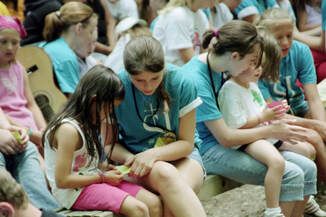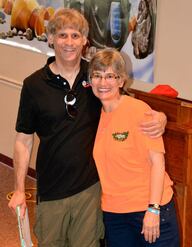Q&A with Gary Pecuch
Co-author of "Faith Webbing"

Q: Talk about how you got started in youth ministry.
A: Unknowingly, we lived parallel lives for a while. We started as summer camp counselors in the early 1980’s. After we graduated from college, we went through youth ministry training programs and were placed in churches in Grove City and Fremont, Ohio. We eventually met in 1983 and married in 1986. We feel blessed to have worked in youth ministry for 40 years now.
Q: What is Faith Webbing and how did you come up with the concept?
A: We have been developing the Faith Webbing concept in our congregation since the late 1980’s. When we first started in ministry, we utilized a popular philosophy called “relational ministry.” Oftentimes, this approach was a youth leader going to school functions or to community events or taking a couple of teens out to a restaurant for the sole purpose of building relationships. The eventual goal was to point young people to Christ. This relationship proved to be important in the life of the young person; however, it often times became the only significant connection to the church. And we quickly figured out we could only have significant relationships with a limited number of youth. We also noticed in other churches that youth leaders did not stay in their positions very long and once that youth leader moved on so did most of the young people. In our situation, we were able to retain and even pull young people back into the church. Numbers were good and parents and church leaders were pleased. However, we noticed that many youth were not hanging around after High School graduation. Something had to change. After rethinking our approach to ministry, we came to the conclusion that although we had healthy attendance numbers at church activities, we were not immersing young people in the life and mission of the church. We had created a ministry separate from the rest of the congregation.
Q: How does Faith Webbing differ from the typical youth ministry program?
A: In order to get young people connected more deeply to church and faith we needed to connect them more deeply with its members and mission. Its premise is to intentionally identify relationship voids in young peoples’ lives and then fill those voids from within the congregation. Some youth may not have a faith-filled parent, grandparent, aunt, uncle, older sibling, or younger sibling in their life. In Faith Webbing, we deliberately identify relational voids and then partner with parents to fill those relationship needs with loving, caring people from within the congregation. It is common for youth to develop “grandparent relationships” with several of the older members. A young person becomes surrounded by numerous faith walks that they can emulate. In essence, the church becomes an extended family of folks all going in the same direction. No longer are children and youth separated from the congregation and expected to meet with just their age group. We now have a healthy balance of age-based programming and interest-based ministry. Young people learn that the journey of faith is not meant to be walked alone and it is advantageous to be in relationship with older wiser members of the faith community.
A: Unknowingly, we lived parallel lives for a while. We started as summer camp counselors in the early 1980’s. After we graduated from college, we went through youth ministry training programs and were placed in churches in Grove City and Fremont, Ohio. We eventually met in 1983 and married in 1986. We feel blessed to have worked in youth ministry for 40 years now.
Q: What is Faith Webbing and how did you come up with the concept?
A: We have been developing the Faith Webbing concept in our congregation since the late 1980’s. When we first started in ministry, we utilized a popular philosophy called “relational ministry.” Oftentimes, this approach was a youth leader going to school functions or to community events or taking a couple of teens out to a restaurant for the sole purpose of building relationships. The eventual goal was to point young people to Christ. This relationship proved to be important in the life of the young person; however, it often times became the only significant connection to the church. And we quickly figured out we could only have significant relationships with a limited number of youth. We also noticed in other churches that youth leaders did not stay in their positions very long and once that youth leader moved on so did most of the young people. In our situation, we were able to retain and even pull young people back into the church. Numbers were good and parents and church leaders were pleased. However, we noticed that many youth were not hanging around after High School graduation. Something had to change. After rethinking our approach to ministry, we came to the conclusion that although we had healthy attendance numbers at church activities, we were not immersing young people in the life and mission of the church. We had created a ministry separate from the rest of the congregation.
Q: How does Faith Webbing differ from the typical youth ministry program?
A: In order to get young people connected more deeply to church and faith we needed to connect them more deeply with its members and mission. Its premise is to intentionally identify relationship voids in young peoples’ lives and then fill those voids from within the congregation. Some youth may not have a faith-filled parent, grandparent, aunt, uncle, older sibling, or younger sibling in their life. In Faith Webbing, we deliberately identify relational voids and then partner with parents to fill those relationship needs with loving, caring people from within the congregation. It is common for youth to develop “grandparent relationships” with several of the older members. A young person becomes surrounded by numerous faith walks that they can emulate. In essence, the church becomes an extended family of folks all going in the same direction. No longer are children and youth separated from the congregation and expected to meet with just their age group. We now have a healthy balance of age-based programming and interest-based ministry. Young people learn that the journey of faith is not meant to be walked alone and it is advantageous to be in relationship with older wiser members of the faith community.

Q: What kinds of results have you seen with this program?
A: Young people go where their relationships are. We tell churches that they need to make sure that their children and youth have scores of healthy, fun, deep relationships from among their attendees. We encourage church members to “love the stuffing” out of their children and youth. Those who grow up in an intergenerational loving faith community form sustainable relationships. The church is one of the only institutions that is organically intergenerational. Most activities in a young person’s life term out. They may get involved in sports, community activities, or music programs for a season of their lives; however, most of those activities are age-specific. Once they term out, much of their support system disappears. People that catch the vision for Faith Webbing become what we call “relationship architects.” That is, they intentionally seek out those in the congregation their children need to know. To date, we have helped over 600 congregations further develop their ministries to young people.
Q: What do most churches lack when it comes to youth ministry?
A: From our perspective what churches lack when it comes to ministry to young people is three-fold. First, churches tend to not be aware of the urgency of the hour. Most young people who are not immersed in the life and mission of the church by age twelve probably never will be. Yet, many churches do not get serious about ministry to young people until they are Middle or High School age. Secondly, churches tend to underutilize the concepts of service and responsibilities. Young people tend to be active doers. They want to make a difference in the world. They enjoy helping others: soup kitchens, homeless shelters, food pantries, etc. And they enjoy leading and having responsibilities like teaching Sunday School to younger youth, leading service projects, running sound systems or managing church social media. We have a list of 40 Faith Skills we are prepared to build into young people. We believe that youth ministry is youth doing ministry. Thirdly, what churches lack in ministry to young people is a vision followed by a long-term strategic plan of action for implementing that vision. Most churches do not have a paid person on staff specifically dedicated to ministry to young people. And even if they do, most youth ministry staffers do not stay long-term. The volunteer system can work; however, volunteers often cycle out as their children age. The end result is that church ministry to young people tends to live month to month, event to event or just through the school year. We coach congregations to develop a workable, sustainable plan.
Q: How important is youth ministry to the body of Christ?
A: The importance of ministry to young people cannot be overstated. Most young peoples’ flight patterns are pretty much determined by age twelve. The sports kids are sports kids, the music kids are music kids, scouts are scouts, etc. We tell churches that the outside activities are all well and good; however, by age twelve we also want our children to be church kids. After age twelve, it gets exponentially harder to engage young people in church and faith. Time, schedules, and the current societal culture make it difficult to keep kids active and growing in their faith. Those that are active throughout high school and beyond tend to be the ones who were immersed in relationships, service and mission by age twelve. Thus, the current and future church is dependent upon its ministry to young people, specifically to preteens.
A: Young people go where their relationships are. We tell churches that they need to make sure that their children and youth have scores of healthy, fun, deep relationships from among their attendees. We encourage church members to “love the stuffing” out of their children and youth. Those who grow up in an intergenerational loving faith community form sustainable relationships. The church is one of the only institutions that is organically intergenerational. Most activities in a young person’s life term out. They may get involved in sports, community activities, or music programs for a season of their lives; however, most of those activities are age-specific. Once they term out, much of their support system disappears. People that catch the vision for Faith Webbing become what we call “relationship architects.” That is, they intentionally seek out those in the congregation their children need to know. To date, we have helped over 600 congregations further develop their ministries to young people.
Q: What do most churches lack when it comes to youth ministry?
A: From our perspective what churches lack when it comes to ministry to young people is three-fold. First, churches tend to not be aware of the urgency of the hour. Most young people who are not immersed in the life and mission of the church by age twelve probably never will be. Yet, many churches do not get serious about ministry to young people until they are Middle or High School age. Secondly, churches tend to underutilize the concepts of service and responsibilities. Young people tend to be active doers. They want to make a difference in the world. They enjoy helping others: soup kitchens, homeless shelters, food pantries, etc. And they enjoy leading and having responsibilities like teaching Sunday School to younger youth, leading service projects, running sound systems or managing church social media. We have a list of 40 Faith Skills we are prepared to build into young people. We believe that youth ministry is youth doing ministry. Thirdly, what churches lack in ministry to young people is a vision followed by a long-term strategic plan of action for implementing that vision. Most churches do not have a paid person on staff specifically dedicated to ministry to young people. And even if they do, most youth ministry staffers do not stay long-term. The volunteer system can work; however, volunteers often cycle out as their children age. The end result is that church ministry to young people tends to live month to month, event to event or just through the school year. We coach congregations to develop a workable, sustainable plan.
Q: How important is youth ministry to the body of Christ?
A: The importance of ministry to young people cannot be overstated. Most young peoples’ flight patterns are pretty much determined by age twelve. The sports kids are sports kids, the music kids are music kids, scouts are scouts, etc. We tell churches that the outside activities are all well and good; however, by age twelve we also want our children to be church kids. After age twelve, it gets exponentially harder to engage young people in church and faith. Time, schedules, and the current societal culture make it difficult to keep kids active and growing in their faith. Those that are active throughout high school and beyond tend to be the ones who were immersed in relationships, service and mission by age twelve. Thus, the current and future church is dependent upon its ministry to young people, specifically to preteens.
About Gary and Laurie Pecuch (pronounced "puh-cooch")

Gary and Laurie Pecuch have over four decades of experience in youth ministry. For ten years, the couple operated a licensed treatment therapeutic foster care home for teenage boys. Gary has a Bachelor’s degree in Administration of Justice and a Master’s degree in Not-for-profit Administration and Management and Laurie has a Bachelor’s degree in Social Work. They currently serve on the children and youth ministry staff at St. John’s Lutheran Church in Grove City, Ohio. Visit http://www.faithwebbing.com for more information.